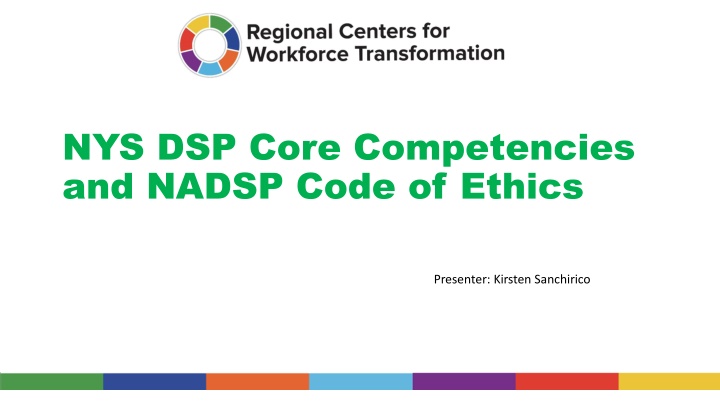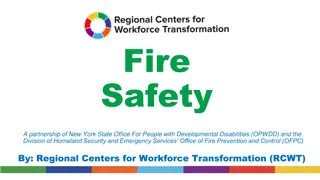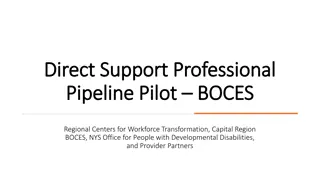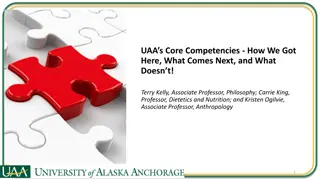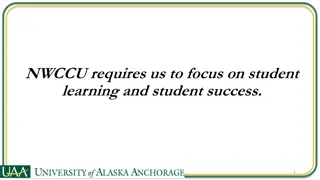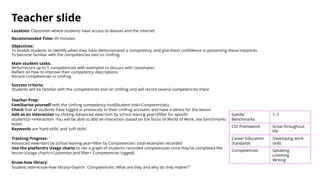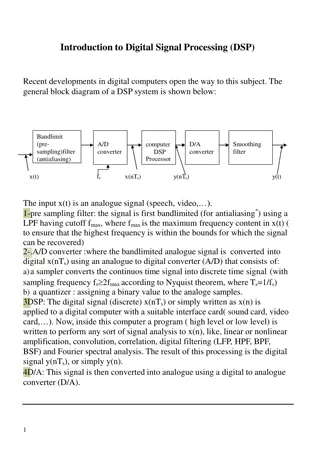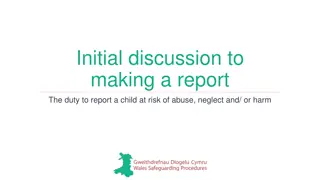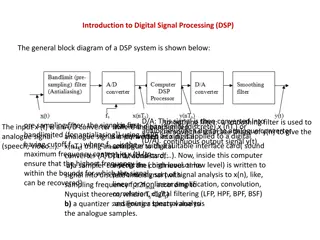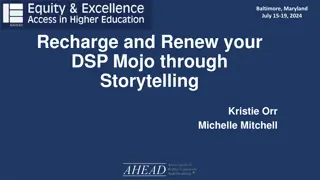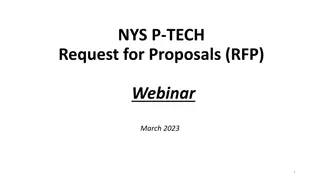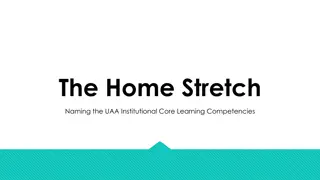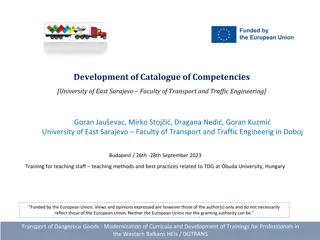NYS DSP Core Competencies and NADSP Code of Ethics
Regional Centers for Workforce Transformation (RCWT) is a nonprofit organization established in 2013 with a focus on developing Direct Support Professional (DSP) workforce through skill-building and ethical decision-making. They aim to empower DSPs to make a meaningful impact on the lives of individuals with disabilities, promoting professionalism and ethical standards.
Download Presentation

Please find below an Image/Link to download the presentation.
The content on the website is provided AS IS for your information and personal use only. It may not be sold, licensed, or shared on other websites without obtaining consent from the author.If you encounter any issues during the download, it is possible that the publisher has removed the file from their server.
You are allowed to download the files provided on this website for personal or commercial use, subject to the condition that they are used lawfully. All files are the property of their respective owners.
The content on the website is provided AS IS for your information and personal use only. It may not be sold, licensed, or shared on other websites without obtaining consent from the author.
E N D
Presentation Transcript
NYS DSP Core Competencies and NADSP Code of Ethics Presenter: Kirsten Sanchirico
About Us Established in 2013, Regional Centers for Workforce Transformation (RCWT) is a nonprofit organization focused on developing the Direct Support Professional workforce through skill-building, empathy, and empowering ethical and informed decision-making. The RCWT recognizes the impact Direct Support Professionals make in the lives of the people they support, and we aim to develop the workforce to be able to make the most meaningful, quality and person-centered impact. To develop the professionalism and capacity of the Developmental Disabilities Workforce in NYS by educating and empowering Direct Support Professionals and Frontline Supervisors in validated competency and ethical stands. Our Mission Our vision is to create a stable and sustainable DSP workforce in New York State one that is ethical, competent, professional, and effective in helping people with intellectual and developmental disabilities live the lives they want to their fullest potential. Strategies for implementing sustainable change: Develop workforce champions in all regions Increase provider engagement and collaboration Support organizational commitment to the DSP Core Competencies and Code of Ethics
Regional Map & Team of Professional Experts 19 REGIONAL LEADS 4 SUBJECT MATTER EXPERTS 2 DIRECT SUPPORT PROFESSIONALS 5 ADMIN SUPPORTS
Growth of the RCWT Team Region 2 Leads: Project Director: Kirsten Sanchirico The New York Alliance for Inclusion and Innovation Jennifer Vogt Dylan Brown Tish Comstock-Allcorn Derek Vladescu Region 3 Leads: Region 1 Leads: Rachel Jacob Chris Fortune Kenny Burr Erica Belois-Pacer Theresa Buick Melody Johnson Region 5 Leads: Denise Anghel Pam Wolff-Stackowitz Heather Thorgensen Lori LaRocco Doriann Adams Region 4 Leads: Sara Schacter-Erenburg Joanne Cropper Asheley Blaise Eliciana Caro Nicole Wan Ketrina Hazell Anthony Ismael
Workforce Transformation Transformation Not Just a Training The goal of OPWDD s Workforce Transformationagenda is to help staff transform from caregivers to support professionals through a Workforce Development Program.
Key Elements: The Why! Staff are the cornerstone of operations. They have a great impact upon the quality of life for the people they support. Staff are faced with ethical challenges daily. Staff often work independent of direct supervision and therefore must exercise good judgment. A code of ethics can serve as a tool for direction and support. Knowing how to resolve ethical dilemmas in the workplace can increase your decision-making effectiveness while keeping you and your organization on the right side of the law and is just the right thing to do.
Changing the way staff work with the people they support To: Direct Support Professional Way Staff who are teaching people how to do the things that they want to know. From: Caregiver Way Staff who are doing things for the people that they support. * 8
NYS DSP Core Competencies The NYS DSP Core Competencies, combined with the Code of Ethics for Direct Support Professionals, are values-based competencies and skills that are the foundation of person- centered supports for people with I/DD Disability is not a reason for depriving any person from making the same choices other people have the right to make. - - Steven J. Taylor, On Choice. TASH Newsletter, 2001 These competencies are part of New York State s Workforce and Culture Transformation initiative What s the transformation all about? From Care Giver to Direct Support Professional From Compliance to Competency The Competencies are broken down into seven goal areas covering all aspects of life for people with developmental disabilities, while also including the professionalism of direct support
DSP Core Competencies Are Learned Skills A demonstration of applied knowledge Seen, measured and evaluated Applicable to ALL Direct Support Professional s Based upon and built from the NADSP Code of Ethics for Direct Support Professionals Values-based skills and the foundation of person-centered supports A Statewide culture transformation process The DSP pathway to professionalism and quality for the people being supported
DSP Core Competencies Are NOT . Annual Checklists A simple training program Something that can be learned quickly
The Role of the DSP: The Role of the DSP: All 7 Goal Areas and 23 Competencies
23 DSP Competencies A: Supporting a Person s Potential B: Getting to Know the Person C: Promoting Advocacy D: Facilitating Personal Development E: Facilitating Supports and Services V: Supporting Community Participation W: Supporting Employment, Educational, and Career Goals F: Building and Maintaining Relationships U: Supporting People to Live in the Home of Their Choice G: Creating Meaningful Communication H: Developing Professional Relationships I: Exhibiting Professional Behavior J: Respecting Diversity and Inclusion K: Creating Meaningful Documentation L: Education, Training, and Self- Development M: Organizational Participation N: Exhibiting Ethical Behavior R: Supporting Crisis Prevention, Intervention, and Resolution S: Supporting Safety T: Ensuring Safety During Environmental Emergencies O: Promoting Positive Behavior and Supports P: Supporting Health and Wellness Q: Preventing, Recognizing, and Reporting Abuse
Where did the DSP Core Competencies come from? The DSP Core Competencies were built on are based upon the National Alliance for Direct Support Professionals (NADSP) Code of Ethics for DSPs In 2011, OPWDD adopted the NADSP Code of Ethics and from that, created the OPWDD DSP Core Competencies
National Alliance for Direct Support Professionals (NADSP) Code of Ethics NADSP s Vision: A world with a highly qualified and professional direct support workforce that partners with, supports and empowers people with disabilities to lead a life of their choosing. NADSP s Mission To elevate the status of direct support professionals by improving practice standards, promoting system reform, and advancing their knowledge, skills and values. NADSP s Values: NADSP values the full participation of people with disabilities in all aspects of community life through the provision of person-centered supports.
How NADSP How NADSP Defines Defines Quality Quality Values, Skills and Knowledge The knowledge and skills of community support practice must be joined with the ethical principles to create the environment needed to fully support people in making life choices . NADSP, 2020
Code of Ethics for Direct Support Professionals While supporting people as they direct the course of his or her own life, DSP s will face ethical decisions. They may feel conflicted when the person has set goals for themselves then make choices and decisions that are not in line with those goals. The National Alliance for Direct Support Professionals (NADSP) Code of Ethics outlines standards of conduct and professionalism that guide DSP s everyday work.
The Nine Tenets of the Code of Ethics The Nine Tenets of the Code of Ethics
The Nine Tenets of the Code of Ethics The Nine Tenets of the Code of Ethics
The Support Model As the role of the staff person evolved towards the standard of the DSP we moved from taking care of people to supporting people to lead the life of their choice The role of the DSP moved from the system having total control over the person to handing control over to them Rather than caregivers we became teachers, mentors and supporters As the gentlemen on the right is pointing out, the relationship between the person and the DSP has evolved into a partnership and moved away from the caregiver role
Person Centered Language What is it? Why it is important? Lets check the pulse . This Photo by Unknown Author is licensed under CC BY-SA-NC 22
Where does this fit in? Where does this fit in? Building and Maintaining Relationships Area G: Creating Meaningful Communication - Modifying communication to ensure understanding - Recognize the impact of possible discrepancies between the person s chronological age and developmental age when communicating. Tenant #1 Person Centered Supports: As a DSP, my first allegiance is to the person I support; all other activities and functions I perform flow from this allegiance.
When supporting someone to use the bathroom, this can also be referred to as toileting A) True B) False
When supporting someone to use the bathroom, this can also be referred to as toileting A) True B) False
A person who doesnt talk could also be referred to as: A) Non-Verbal B) Someone who doesn t use words to communicate C) Mute D) Profound
A person who doesnt talk could also be referred to as: A) Non-Verbal B) Someone who doesn t use words to communicate C) Mute D) Profound
Feeding is an acceptable term to use when describing dinner for people we support ? A) True B) False
Feeding is an acceptable term to use when describing dinner for people we support ? A) True B) False
A person who doesnt use words to communicate, requires 10 minute visual checks and total support with every day living skills is ___________ A) Low- functioning B) Slow C) In need of extra support D) Severely retarded
A person who doesnt use words to communicate, requires 10 minute visual checks and total support is ___________ A) Low- functioning B) Slow C) In need of extra support D) Severely retarded
A person who has a job, drives a car and lives in an apartment with minimal support is considered ____________ A) Normal B) High functioning C) None of the above D) All of the above
A person who has a job, drives a car and lives in an apartment with minimal support is considered ____________ A) Normal B) High functioning C) None of the above D) All of the above
When someone takes a trip to the mall, this is called: A) An outing B) An Activity C) Going out into the community D) A trip to the mall
When someone takes a trip to the mall, this is called: A) An outing B) An Activity C) Going out into the community D) A trip to the mall
The appropriate term for when someone doesn t want to do something is: A) A behavior B) Non-compliant C) A refusal D) None of the above
The appropriate term for when someone doesn t want to do something is: A) A behavior B) Non-compliant C) A refusal D) None of the above
Using the term my Guys or our guys is a very person-centered term A) True B) False
Using the term my Guys or our guys is a very person-centered term A) True B) False
Which of these is the best option for use? A. Residents B. Individuals C. People we serve D. People we support
Which of these is the best option for use? A. Residents B. Individuals C. People we serve D. People we support
Follow up How to address tough PCT situations Peers Community members Supervisors Family members 42
NY States DSP Core Competencies NY State s DSP Core Competencies and the NADSP Code of Ethics and the NADSP Code of Ethics Keep the DSP Core Competencies And the NADSP Code of Ethics in your tool belt all the time!
Find us Online Facebook Instagram YouTube
Thank you for all that you do!
